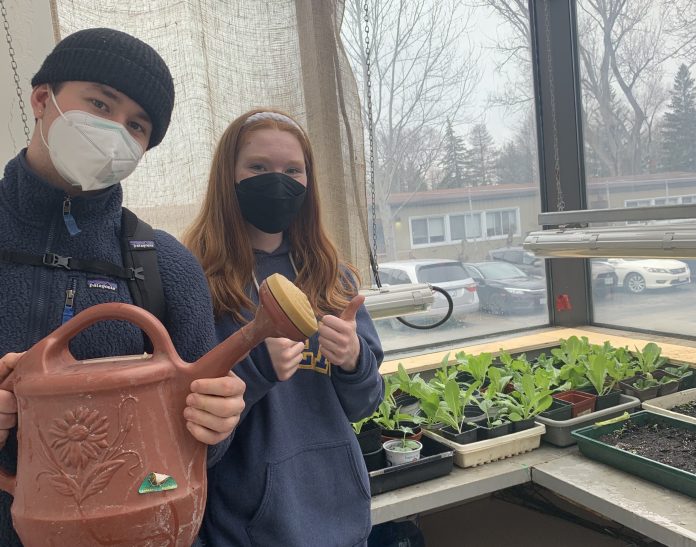By Olivia Milley
April was Earth Month, so I took the opportunity to speak with Emily Drummond and Timmy Lewis, two senior members of the Nepean Environment Club. They were excited to tell me about their club’s eco-initiatives and how community members can have a positive impact on the environment in their daily lives.
Drummond has been involved in the club since her first year of high school, and has taken on more of a leadership role these past two years. Lewis, another Grade 12 student, joined the group through his Resource Management class and has since been an active member.
The Environment Club meets weekly to discuss their various sustainability initiatives, organize greenhouse maintenance and implement their compost program. At the time of writing, they were focused on planning Nepean’s Earth Week, which included exciting daily activities: a discussion about climate justice, a recipe using fresh ingredients from the greenhouse, the screening of a fun environmental movie, and a community garbage clean-up involving over 125 students. The club also ran a battery collection competition to encourage students to properly dispose of old electronics.
Aside from Earth Week, the Environment Club spearheaded the operation to get the school’s greenhouse up and running in November. Being seldom used in recent years, the greenhouse needed lots of love, which the students readily provided. It was thoroughly cleaned, and now, Lewis is part of the group that regularly maintains the space.
As for the actual plants in the space, Drummond said, “There often are plants or seeds being started by classes, but we also have quite a few trees or plants we’ve started
ourselves.”
Lewis added that the greenhouse is now being used by biology and environmental science classes.
One of the club’s main growth projects is a primarily self-sustaining hydroponic tower, which contains hundreds of seeds such as basil, spinach and lettuce. A Grade 11 class is now responsible for harvesting and selling the produce grown in the tower—in the future, the Environment Club hopes to donate the produce to local food banks.
As for you, dear reader, Drummond and Lewis have many excellent suggestions for simple eco-friendly actions. For example, get creative and start reusing items instead of just discarding them. Opt for reusable products like cloth bags over plastic grocery bags or single-use items.
Further, they strongly encourage individuals to take advantage of resources such as indoor and community gardens for locally-grown produce. Lewis tells me that, from his experience with the gardening community, people are more than willing to lend a helping hand to novices.
It’s amazing to see these passionate students building eco-friendly initiatives at our school and encouraging a greener future. Keep an ear out for their upcoming projects and hope you had a happy Earth Month!
